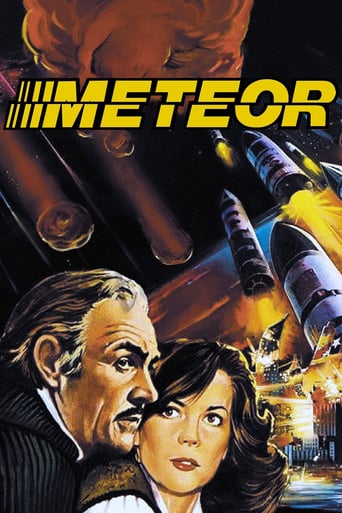

Although it has its amusing moments, in eneral the plot does not convince.
... View MoreI didn’t really have many expectations going into the movie (good or bad), but I actually really enjoyed it. I really liked the characters and the banter between them.
... View MoreWhile it is a pity that the story wasn't told with more visual finesse, this is trivial compared to our real-world problems. It takes a good movie to put that into perspective.
... View MoreIt really made me laugh, but for some moments I was tearing up because I could relate so much.
... View MoreThere is a Meteor on collision course with Earth and if we don't stop it then, well its bye bye for a lot of us! Meteor is a disaster movie that came out in 1979 when the genre was winding down people had, had enough of buildings collapsing, airplanes crashing and boats capsizing which is part of the reason I think this movie has been ridiculed ever since, sure the special effects aren't great and the use of stock footage is a bit cheap but for its time they aren't that bad. The story line is fairly interesting trying to get America and Russia to combine its nuclear weapons to destroy the large rock during the Cold War wouldn't of been easy and the tension between the two groups is well presented. The acting from all involved including Sean Connery (getting shaken but not stirred), Natalie Wood, Henry Fonda and Karl Malden is OK but nothing special and almost tongue in check which is probably the best way to take this film.Before the daddy rock takes aim, we get baby ones coming along for the ride causing snow storms, avalanches, tidal waves and the destruction of New York City, perhaps a few more would of helped things move along quicker.The ending is quite predictable but then we couldn't have the rock destroying us all could we? It is probably drawn out a bit to long and at this point in the film I thought the scenes back on earth with our stars clambering there way through subways was more interesting.So all in all, yes its a bit corny, yes its a bit camp and yes it certainly isn't a great film but on the other hand, it should hold your attention and isn't that bad either, if it had been released a few years earlier when disaster was big business then I do think it would of been a better received film and is at least as good as most other disaster movies from the 1970s.
... View MoreMy big problem with this movie is that there are times when it seems the director wanted to tell the story in real time. The bulk of the viewing audience is very accustomed to the abbreviations in the action in order to keep the pace exciting. It may have been that the director through dragging out some of the sequences would help build suspense. What it really did was to underscore the lack of suspense inherent to the story. Watching the missiles for minutes on end only made this viewer realize just how little I cared by that point. Part of me was rooting for the meteor, for mercy's sake. Given the era, and nearly ten years of riveting disaster movies that went before it, it's inexcusable that this one couldn't keep us on the edges of our seats.
... View MoreMany have speculated that the dinosaurs that once ruled the planet were wiped out when a planetary body made contact with Earth sixty-five million years ago. And every once in a while in cinematic history, filmmakers have exploited this particular fear that similar collision between our planet and either a comet or meteor could do cataclysmic, end-of-the-world type damage to our planet, as was shown in films such as 1933's DELUGE and 1951's WHEN WORLDS COLLIDE, and which would be shown yet again in 1998's Armageddon and DEEP IMPACT. The first real film in our present context to show what might very well happen in the admittedly unlikely event of such an interstellar collision was the 1979 science fiction/disaster film METEOR.In this film, scientists have discovered a five mile-wide meteor named Orpheus, which was blasted out of the asteroid belt that lies between Mars and Jupiter by a collision with a comet. An American space crew exploring the asteroid belt is killed in that collision; and what scientists discover next is that the resulting asteroid that was knocked out of its orbit is on a direct collision course with Earth—a collision that, in the words of a prominent astronomer (Sean Connery), could create another Ice Age. The only hope anyone has of stopping Orpheus from penetrating Earth's atmosphere is to blast it with nuclear weapons; and while both the U.S. and Russia have such weapons in orbit, they are pointed downward at one another. Over the strenuous objections of a virulent anti-Communist general (Martin Landau), Connery and NASA's chief (Karl Malden), together with Connery's Russian counterpart (Brian Keith) manage to get both American and Russian nuclear arsenals pointed away from Earth, and towards the approaching meteor. In the meantime, however, splinter pieces of Orpheus do manage to penetrate the atmosphere. One causes a massive avalanche that buries a ski resort; another creates a 100 foot-high tsunami that wipes out Hong Kong; and a third, much larger piece nails New York City, creating a horrific situation in which Connery, Malden, Keith, and Keith's assistant (Wood) must crawl out of their underground tomb, through a muddy subway tunnel, and hope that their nuclear gambit succeeds.Released in late 1979 at the very tail end of the disaster film craze, METEOR did only moderately well at the box office, and, unsurprisingly, was almost universally panned by the critics. Furthermore, given its having been made under the auspices of the low-budget American International Pictures company, it clearly relies just a bit too much on the use of stock footage (specifically from previous films like AVALANCHE and TIDAL WAVE) instead of new special effects (in this respect, DEEP IMPACT is clearly the superior "space rock" movie). And in terms of acting, METEOR falls a bit short there too, especially in the overzealous performance of Landau, normally a very good actor, and a melodramatic script that occasionally veers uncomfortably close to unintentional humor.In other aspects, though Meteor does manage to overcome its pratfalls, due to solid performances by Connery, Malden, Fonda (as the President), Richard Dysart, Joseph Campanella, Bibi Besch, Sybil Danning, and Michael Zaslow. And where there is no stock footage used, the destruction sequences supervised by Glen Robinson, who had won an Oscar for his work on the 1974 science fiction/disaster film EARTHQUAKE, are about as good as anything seen in the days before CGI, especially in the near-total destruction of New York, even though, in retrospect, one is reminded too much of the immediate aftermath of 9/11 in those images. As a result, though it is a forgotten relic from a less-than-sophisticated era in science fiction and special effects, METEOR, under the professional direction of Neame (who helmed THE POSEIDON ADVENTURE for "disaster master" Irwin Allen in 1972), is nevertheless and entertaining, if somewhat dreadful look at what could possibly happen to Earth if a wayward interstellar body, be it a meteor or a comet, ever got past our protective atmosphere. For all its pratfalls, and despite its being a product of the Cold War in its plotting, its essential theme remains timeless and timely.
... View MoreThis movie is, above all, an egregious waste of a world-class cast. Did the producers spend all of their money hiring the cast and have nothing left with which to build a decent vehicle for them? That seems to be the only explanation. Everything about 'Meteor' is cheesy: the dialogue, the 'special' effects, the plot, the direction, the music, the editing. Most of the actors look as if they are sleepwalking through their scenes; as if their awareness that they are participating in cinematic malpractice is creating an apathetic milieu. The only bright spot is Brian Keith, who speaks all of his lines in very convincing Russian. He must have worked very hard to pull that off. Natalie Wood also converses in Russian, but this was almost her native tongue, so it comes naturally to her.SPOILER: Very little in 'Meteor' makes sense. Missiles launch in slow motion; people run downhill to escape a tsunami; scientists say that all of the missiles MUST arrive simultaneously in order to have the desired effect, but success is achieved when they arrive at separate times; the subway floods at the end because of 'the river'(?) but more likely because the producers wanted to add another element of danger and a few more minutes to the running time.All in all, 'Meteor' is a total waste. It is only memorable as a small monument to ineptitude.
... View More